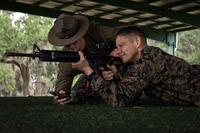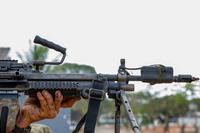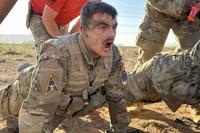
Perhaps I can finally put up a post everyone can agree on (yeah, right), and especially on a day like today when I get comments like this
Unreal. You sir, will never qualify for "Are you smarter than a 5th grader?"
Or this one
You and Rumsfeld should enjoy a martini together.
If this article wasn't free to read, I'd cancel my subscription today. Not because of your opinion, but because you possess no expertise in the field in which you report on.
Alright, here you go guys: Journalists (like me) suck
So says a new report from the Joan Sorenson Center on the Press, Politics and Public Policy at Harvard University though not in such pedestrian terms.
In a thorough analysis of media coverage during the 2006 Israel/Hezbollah war (which I covered from Cyprus and Beirut for the Military Times newspapers and USA Today), media sage - and no friend to its critics on the right - Marvin Kalb paints a disturbing picture of media bias, manipulation and outright advocacy for the Hezbollah cause.
I remember telling my colleagues back home that from my perspective at the US Embassy in Beirut, you couldnt tell there was a war going on at all. Life continued as normal on the streets and civilians went about their daily business unencumbered. There was no smoke rising from the hills, no explosions, no panic. My observations fell on deaf ears, most suspecting I was a right-wing, Israel-loving nut.
The exhaustive Harvard study calls into question the rapid assertion by Human Rights Watch that the Israeli military committed war crimes and the medias reluctance to hold Hezbollah to account for its own criminal behavior. The various instances of doctored photos (such as the above Reuters photo) and exaggerated casualty claims are mere sideshows to the outright failure to adhere to the journalistic mantra of balanced coverage without editorializing opinion.
Because Hezbollah functioned as a quasi-military force within its populace, protecting it, feeding it, housing it, and in general caring for its needs, the Israelis were quickly accused of hitting civilian targets with an indiscriminate callousness amounting to war crimes.
On August 3, Human Rights Watch specifically accused Israel of war crimes. Few seemed to note that before the war, on May 27, Nasrallah had actuallyand publiclyembraced the guerrilla tactic of hiding soldiers among civilians. [Hezbollah fighters] live in their houses, in their schools, in their churches, in their fields, in their farms and in their factories, he said, adding, You cant destroy them in the same way you would destroy an army.
By wars end, it was clear that Nasrallah was right. Hezbollah, though severely wounded, remained a fighting force in defiant objection to all U.N. resolutions calling for it to be disarmed.
Israel defended its military operations by citing two relevant articles in international law: using civilians for military cover was a war crime, and any target with soldiers hiding among civilians was considered a legitimate military target. Israels foreign minister, Tzipi Livni, framed her governments argument in cold language. When you go to sleep with a missile, she told The New York Times, you might find yourself waking up to another kind of missile.
Israels defense, though, fell on deaf ears, not only among diplomats but also reporters, as daily evidence mounted of civilian deaths. Hezbollah, whenever possible, pointed reporters to civilian deaths among Lebanese, a helpful gesture with heavy propaganda implications. Early in the war, reporters routinely noted that Hezbollah had started the war, and its casualties were a logical consequence of war. But after the first week such references were either dropped or downplayed, leaving the widespread impression that Israel was a loose cannon shooting at anything that moved.
Theres also a disturbing passage about possible complicity by the United Nations in Hezbollahs many deadly ambushes of Israeli troops.
UNIFIL was the United Nations Interim Force in Lebanon. It consisted of roughly 2,000 troops stationed along the Lebanese-Israeli border from 1978 until the end of the 2006 war. Its mandate required full impartiality and objectivity.
During the war, it published information on its official website about Israeli troop movements, information that in military circles might well be regarded as actionable intelligence.
Take, for instance, its posting of July 25, 2006:
Yesterday and during last night, the IDF (Israeli Defense Forces) moved significant reinforcements, including a number of tanks, armored personnel carriers, bulldozers and infantry, to the area of Marun Al Ras inside Lebanese territory. The IDF advanced from that area north towards Bint Jubayl and south towards Yarun.
Or, its posting of July 24, which disclosed that IDF forces stationed between Marun Al Ras and Bint Jubayl were significantly reinforced during the night and this morning with a number of tanks and armored personnel carriers.
It was part of UNIFILs responsibility to report violations of the ceasefire, including troop movements, to the U.N., but presumably this information was to be conveyed through confidential channels, not on the Internet, where the information in wartime could be as valuable as hard, military intelligence suddenly exposed to the light.
These postings, similar to others during the war, coincided with heavy fighting in the region. Israeli units came under severe Hezbollah attack.
It is impossible for outsiders to know whether Hezbollah used the information provided by UNIFIL, which was available to anyone with a laptop, or whether Hezbollah depended primarily upon information provided by loyal local supporters. However, no UNIFIL posting during the war contained any specific information relating to Hezbollahs military movements, perhaps because they were not visible to UNIFIL or perhaps because UNIFIL did not choose to see the movements.
Frida Ghitis at World Politics Watch has an outstanding write up on the report. She points out the increasing role media coverage plays in a non-state strategy of asymmetric warfare.
Before long, Hezbollah had achieved a definitive propaganda victory. The media had not only acquiesced to tell Hezbollah's version of the war, they had started contributing to the creation of the narrative, with at least one Reuters photographer altering photographs to make Israeli attacks look more damaging. And many reporters simply failed to offer much context. The study quotes the New York Times' Stephen Erlanger commenting on a satellite picture published by his paper. The picture showed a southern suburb of Beirut, which was largely destroyed. Erlanger said it "bothered me a great deal," because the image with no context failed to show that this was a small part of a Beirut, and the rest of the city was largely undamaged by the war.
The Harvard paper shows the need for journalists to brace themselves and remain vigilant when they cover conflicts between open societies on one side, and media-controlling militias on the other. These conflicts, which we will undoubtedly continue to see, demand that journalists make a greater effort to provide context and to keep from become willing collaborators with one side. Islamic militant groups, such as al-Qaida and others, have openly described their strategy of manipulating the media and winning on the "information battlefield." Hezbollah, too, had a well crafted, and ultimately successful media plan.
I cant help but recognize the timing of this report, which comes as Congress votes to cede the battle of Iraq to Islamic extremists based on coverage of daily carnage and continued U.S. military deaths. As Kalb sums up:
In an open society, ground rules may be announced, but they are not likely to be observed or enforced. During the 2006 summertime war in the Middle East, it was Israel versus Hezbollah, led by the charismatic Hassan Nasrallah, and because Israel did not win the war, it is judged to have lost. In Iraq, in the not too distant future, it may well be the United States versus the Mahdi Army, led by the equally charismatic Sheik Moqtada al-Sadr. The challenge for responsible journalists covering asymmetrical warfare, especially in this age of the Internet, is new, awesome and frightening.
-- Christian







